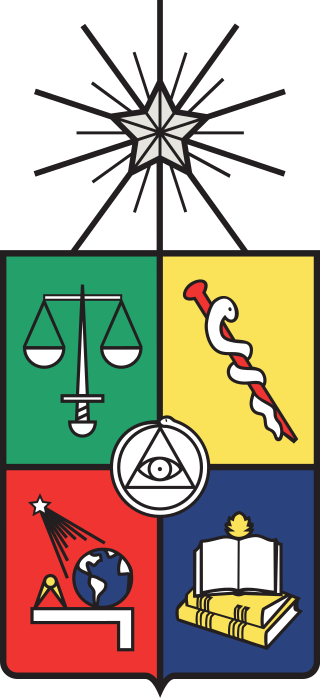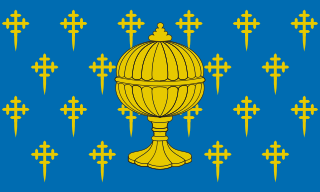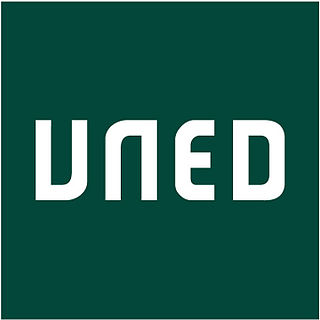
Galicia is an autonomous community of Spain and historic nationality under Spanish law. Located in the northwest Iberian Peninsula, it includes the provinces of A Coruña, Lugo, Ourense, and Pontevedra.

Santiago de Compostela or Compostela is the capital of the autonomous community of Galicia, in northwestern Spain. The city has its origin in the shrine of Saint James the Great, now the Cathedral of Santiago de Compostela, as the destination of the Way of St. James, a leading Catholic pilgrimage route since the 9th century. In 1985, the city's Old Town was designated a UNESCO World Heritage Site.

The province of A Coruña is the northwesternmost province of Spain, and one of the four provinces which constitute the autonomous community of Galicia. This province is surrounded by the Atlantic Ocean to the west and north, Pontevedra Province to the south and Lugo Province to the east.

The University of Chile is a public research university in Santiago, Chile. It was founded on November 19, 1842, and inaugurated on September 17, 1843. It is the oldest in the country. It was established as the continuation of the former colonial Royal University of San Felipe (1738), and has a rich history in academic, scientific and social outreach. The university seeks to solve national and regional issues and to contribute to the development of Chile. It is recognized as one of the best universities in Latin America for its leadership and innovation in science, technology, social sciences, and arts through the functions of creation, extension, teaching, and research. It is considered the most important and prestigious university in the country.

Lugo is a city in northwestern Spain in the autonomous community of Galicia. It is the capital of the province of Lugo. The municipality had a population of 98,025 in 2018, making it the fourth most populous city in Galicia.

The Pontifical Catholic University of Chile is one of the six Catholic Universities existing in the Chilean university system and one of the two pontifical universities in the country, along with the Pontifical Catholic University of Valparaíso. Founded in 1888, it is also one of Chile's oldest universities and one of the most recognized educational institutions in Latin America.
The Xunta de Galicia is the collective decision-making body of the government of the autonomous community of Galicia, composed of the President, the Vice-President(s) and the specialized ministers (Conselleiros).
The Compostela Group of Universities (CGU) is an international non-profit association that promotes and executes collaboration projects between institutions of higher education. It currently has 67 full members, 2 associate members and 9 mutual membership agreements with institutions from 27 different countries.

The University of A Coruña is a Spanish public university located in the city of A Coruña, Galicia. Established in 1989, university departments are divided between two primary campuses in A Coruña and nearby Ferrol. The A Coruña campus is spread over three suburbs on the outskirts of A Coruña: Elviña and Zapateira and Oza.

The University of Vigo is a public university located in the city of Vigo in the Province of Pontevedra, Galicia, Spain. There are three campuses:

The University of Santiago de Compostela - USC is a public university located in the city of Santiago de Compostela, Galicia, Spain. A second campus is located in Lugo, Galicia. It is one of the world's oldest universities in continuous operation.

The Kingdom of Galicia was a political entity located in southwestern Europe, which at its territorial zenith occupied the entire northwest of the Iberian Peninsula. It was founded by the Suebic king Hermeric in 409, with its capital established in Braga. It was the first kingdom that officially adopted Catholicism. In 449, it minted its own currency. In 585, it became a part of the Visigothic Kingdom. In the 8th century, Galicia became a part of the newly founded Christian Kingdom of Asturias, which later became the Kingdom of León, while occasionally achieving independence under the authority of its own kings. Compostela became the capital of Galicia in the 11th century, while the independence of Portugal (1128) determined its southern boundary. The accession of Castilian King Ferdinand III to the Leonese kingdom in 1230 brought Galicia under the control of the Crown of Castile.

The National Distance Education University is a distance learning and research university founded in 1972 and is the only university run by the central government of Spain. It has headquarters in Madrid, Spain, with campuses in all Spanish autonomous communities. In addition, there are 14 study centres and 3 exam points in 13 countries in Europe, the Americas and Africa. The University awards undergraduate and postgraduate degrees, as well as non-degree qualifications such as diplomas and certificates, or continuing education units.

José Daporta González (1911–1989) was a professor of Hygiene and Microbiology as well as a prolific Fine arts Collector. Born in Habana (Cuba), the son of Galician emigrants, he returned to the land of his parents at an early age, where he started and finished his university studies, to become a professor of the University of Santiago de Compostela at a young age.
The Galician People's Union is a Galician nationalist and communist political party, and is one of the registered political parties of Spain. The party publishes the magazine Terra e Tempo, and the secretary general is Néstor Rego.

Xosé Manuel Hixinio Beiras Torrado is a Galician politician, economist, writer and intellectual. He is professor of Structural Economy at the Faculty of Economic Sciences of the University of Santiago de Compostela. He is a former member of the National Council of the Galician Nationalist Bloc, he is currently the leader of Renewal–Nationalist Brotherhood, an independentist political party. He formerly had representation in the Galician parliament.

The Galician Student League is a student union that advocates for a public education, in galician language, democratic, of quality and not patriarchal. It is an open organization, which is governed by internal democracy and horizontal assemblies. In the LEG can participate any high school, vocational training or university student.

Antonio Fraguas Fraguas was Galicianist historian, ethnographer, anthropologist, and geographer. In 1923, he cofounded the Sociedade da Lingua, whose main goals were the defense of the Galician language and the creation of a dictionary. He was a member of Irmandades da Fala and Seminario de Estudos Galegos and was high school professor after the Spanish Civil War broke out. He was part of the Father Sarmiento Institute for Galician Studies and the Royal Galician Academy, and was director and president of the Museum of the Galician People, member of the Council of Galician Culture, and a chronicler of Galicia. He spent his life studying Galician culture and its territory from different perspectives, with a special focus and mastery on anthropology.

Néstor Rego Candamil is a Galician teacher, politician and a member of the Congress of Deputies of Spain. He is leader of the Galician People's Union.

















